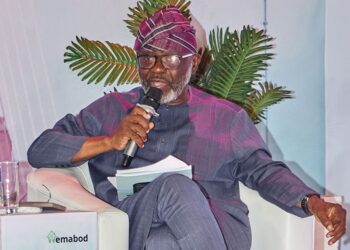Nigeria renewed its bilateral currency swap agreement with China six years after the deal was initially struck.
The Central Bank of Nigeria (CBN) and the People’s Bank of China (PBOC) recently announced the renewal of the arrangement, with the agreement amounting to N3.28 trillion, equivalent to approximately 15 billion yuan or $2.09 billion.
This was six years after the apex bank signed a bilateral currency swap agreement with the People’s Bank of China (PBoC) worth about $2.4 billion.
The deal was intended to reduce the demand for US dollars by Nigerians importing from China and consequently strengthen the value of the naira.
As of the time the deal was signed, Nigeria-China trade relations were worth about $15 billion annually, and the exchange rate was N330 to one dollar.
Internationalisation of Chinese yuan
China is ramping up efforts to boost the yuan’s appeal as an alternative currency in international trade and as a reserve currency in the face of US dollar hegemony.
Countries from South America to the Middle East are trying to sidestep the long-dominant American currency instead of China’s yuan.
Since 2009, China has signed currency swap agreements with numerous countries and regions such as Argentina, Belarus, Brazil, Canada, ECB, Hong Kong, Iceland, Indonesia, Malaysia, Singapore, South Korea, Thailand, the United Kingdom, Uzbekistan and Tajikistan.
On November 20, 2023, the People’s Bank of China and the Saudi Arabian Monetary Authority signed a three-year currency swap of US$6.98 billion.
Deal failed to stabilise naira six years after
While expectations were high regarding the prospect of the currency swap deal stabilising the naira, the local currency has experienced a depreciation never seen in two decades within the six years of the agreement.
According to analysts, the deal was never followed through because even the availability of yuan was an issue despite the currency swap deal.
“It (yuan) was not an option across the trading window as of then, and the mode of operation was also not very clear; thus, it led to its abandonment,” Lead economist and enterprise partner at SPM Professionals, Paul Alaje, said.
From 2018 till date, the naira-to-dollar exchange has increased by over 473 per cent going by the present exchange rate. The local currency has experienced a free fall since the CBN adopted a unified exchange rate in 2023.
No clear resolution between CBN, the People’s Bank of China – Ex-Chinese envoy
In an interview with Daily Trust in March 2024, the immediate past Chinese Ambassador to Nigeria, Mr Cui Jianchun, said: “I am somewhat disappointed that there has not been a clear resolution between the two central banks, namely the Central Bank of Nigeria and the People’s Bank of China.
“Chinese and Nigerian businessmen face challenges in terms of trade between the two countries. Currently, Chinese businesses need to use the Yuan to purchase dollars before importing goods from Nigeria, and similarly, Nigeria needs to use the Naira to buy dollars before importing from China, leading to bureaucratic hurdles.
“I engaged in discussions with the former CBN administration on the possibility of direct trade in our local currencies, utilising the Yuan and Naira. The idea was for Nigerian individuals to buy goods from China in Yuan, while Chinese buyers could purchase Nigerian products like oil, gas, raw materials and finished goods using the naira.
“Initially, the Buhari government was keen on implementing the currency swap; however, a change in plan by the federal government through the CBN halted progress, necessitating a period of waiting.”
He opined that there is still the potential to negotiate and finalise the currency swap deal under the Bola Tinubu administration.
He disclosed that discussions were underway for CBN officials to visit Beijing to advance the currency swap agreement.
He said: “Money serves not only as a medium for trade and investment settlement but also as the country’s reserve. With various currencies like US dollars, euros, pounds and the Chinese yuan in circulation, I am optimistic that we can soon conclude the currency swap deal due to China’s significant trade relationship with Nigeria, compared to that of the Americans or Europeans.
“We need the cooperation of both central banks. The next step involves allowing the Nigerian side to join the Chinese system, SIPs, followed by establishing payment systems and receiving support from commercial banks.
“The Chinese central bank and the ICBC are collaborating with the Nigerian side. I can assure you that in a not-too-distant future we can achieve the currency swap. A new currency system is necessary due to the weaponisation of the US dollars by the United States of America.”
Any hope in sight?
The new currency swap agreement, valid for three years, retains the option for further renewal based on mutual consent between the two central banks.
This mechanism has proven beneficial for both nations, providing a framework for financial collaboration that simplifies Nigerian naira and Chinese yuan transactions.
By renewing this agreement, both countries aim to expand the use of their respective currencies in international trade and reduce dependency on third-party currencies like the US dollar.
According to the People’s Bank of China’s statement, the renewed arrangement is expected to bolster bilateral trade and investment between the two economies significantly.
The currency swap provides businesses in both countries with greater ease of access to local currencies, thereby reducing transaction costs and streamlining trade processes.
This move aligns with the broader objective of enhancing economic cooperation between China and Nigeria, which share strong commercial and diplomatic relations.
Furthermore, the agreement reflects a strategic effort to encourage the internationalisation of the Chinese yuan while simultaneously promoting the stability of the Nigerian naira in global financial markets. This collaboration is part of a larger trend in which countries explore alternatives to traditional trade settlement methods, fostering a more inclusive and diversified global financial system.
“Through initiatives like this, both nations aim to create a conducive environment for sustainable economic growth and development,” China said.
Speaking further about the new agreement, Alaje stated that those who signed it believed it was a “magical solution” that would eliminate the need for dollars. However, this is not the case.
“That yuan or whatever currency is already tied to the dollar. Our own too is tied to the dollar. It will just reduce availability which is good that we are signing it again. But it does not insulate us away from the rest of the world. But availability concerns, which contribute to inflation or loss of confidence in the naira, will reduce,” he said.
The economist said for the new agreement to work, the government must make the yuan available.
“It has to do with the government making it available the way we make dollars available to those who want to do business, especially in China, making it an option across the board, across the trading window…. The thing is if we make it an option, it will really promote and facilitate trade better. But it is a good development,” he added.
Daily Trust reported that Dr Muda Yusuf, Director/CEO of the Centre for the Promotion of Private Enterprise (CPPE), said that while renewing the agreement was a welcome development, the amount involved was insignificant compared to the trading volume between Nigeria and China.
He said, “This currency swap is just about $2bn over three years. In a trade relationship that is about $23bn annually, it would not have a significant impact. Symbolically, it may be good, but when you relate the amount involved to the total amount of trade, it is insignificant.”











